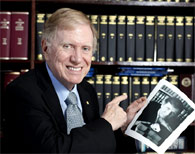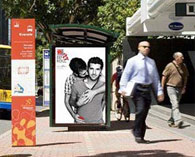In his one-hour talk on 31 May 2011, Australian Justice Michael Kirby (retired) engaged the audience from the Singapore Law Society with three key issues as requested by Society president Michael Hwang: the advantages of a having a permanent Law Reform Commission, when and how to refer to evolving international jurisprudence in deciding domestic cases and the legacy of anti-gay statutes from the days of the British Empire. [Read Retired High Court judge: Gays in Singapore keep it ''quiet'' due to gay sex law here.]

Kirby is perhaps Australia’s best-known judge from its apex court and is currently a member of the Commonwealth of Nations’ Eminent Persons Group looking into the future of the organisation.
With humour enlivening a lucid discussion of the issues, at many points grounded on specific cases he had decided in the course of his long career, the hour flew swiftly by. In the main, his very talk validated a point he made right at the beginning: that early in his own career, he surprised himself by learning a lot through taking time off to attend esoteric talks and seminars once in a while.
There was however one weak argument. It bothered me that it alone could damage much of what he said in the third part — on anti-gay legislation. Referring to the fact that over forty of the 54 members of the Commonwealth have laws equivalent to our Section 377A of the Penal Code or our old Section 377, whereas non-Commonwealth countries do not (except those from the Arab World, drawing their legal tradition from Islam), Kirby pointed out that two-thirds of the world’s HIV cases are found in Commonwealth countries, when the Commonwealth has one-third of the world’s population.
He expanded this argument by explaining how criminalisation creates social conditions that compel gay people to remain invisible; this in turn makes it very hard for health information and services to reach them — and that is if governmental services are even prepared to try to do so. The world over, bureaucrats would not be keen to be seen condoning criminal behaviour. This is certainly a good description of the situation in Singapore and many other countries. This criticism of laws against homosexuality is not new; it has been made many times before by any number of organisations including UNAIDS.
The problem is that while anti-gay legislation does indeed have this adverse effect on the health of gay and transgendered communities, a cursory look at the pattern of the HIV epidemic in Commonwealth countries will reveal that most cases are transmitted heterosexually. Kirby did try to enlarge his point by saying that anti-gay laws are just one example of the kinds of laws and policies that marginalise people at risk, e.g. sex workers, or women generally, all blunting efforts at outreach to their respective segments of society, but this mention was so quick in passing, I was afraid people might not have digested it. And that all they were left with was the impression that he had claimed anti-gay laws were the cause of the much higher incidence of HIV in Commonwealth countries. In the general case, that claim does not stand, no matter how pertinent it is to HIV among gay and transgendered people.
* * * * *
I am always concerned about over-reaching when it comes to arguments for gay equality. In the years 2003 – 2005, many gay Singaporeans, heartened by the references that ministers and the (Singapore) Straits Times made about Richard Florida's book The rise of the creative class, began to adopt the same economic framework to argue for gay equality and the repeal of Section 377A. The reduction of gay equality to a matter of economic benefit troubled me. Even worse were references to the Pink Dollar, with the unstated characterisation of gay people as better off than average (Where’s the evidence? I asked) and mindlessly consumerist.
Likewise, I am uncomfortable with too much focus on the health benefits of repeal. Firstly, the benefits can be limited because there are plenty of other factors that impact on the effectiveness of health services, and secondly, it misses the point. People who favour anti-gay legislation do so not because they primarily want to damage the health of gay people. There are a whole host of other reasons that still need addressing.
However difficult, we cannot shirk from the most fundamental reason for repeal of Section 377A and gay equality in general: Equality is a human right, and to impair equality for one group today would undermine the claim to equality for all other groups tomorrow.
* * * * *
For a brief 24 hours around the time Kirby was speaking inside the Supreme Court Auditorium, his own country, Australia, was providing an example of both the weakness and strength of his argument.
Australia, just in case some readers don’t know, does not have anything like our Section 377A that makes “gross indecency between two males” a criminal offence. In that sense, it is free from anti-gay legislation. Still, it is far from paradise. Homophobic groups continue to exist and to exert themselves.
The photo on the right is of an advertisement that was up on bus stops around Brisbane for barely a week before they were taken down.
|
HIV campaigners are outraged a safe sex promotion featuring a fully clothed, hugging gay couple has been pulled from Queensland bus shelters. The Queensland Association for Healthy Communities launched its “Rip and Roll” advertisements a week ago and today learned they were being scrapped after about 30 complaints. The adverts feature a black and white image of a gay couple embracing, holding an unopened red condom packet. It includes the website address and hotline for Healthy Communities, which has been receiving state government funding for sexual health promotion since 1988. Adshel, the company that provides advertising for Brisbane’s bus shelters; Goa Billboards; and the Advertising Standards Bureau were targeted in an orchestrated campaign by the Australian Christian Lobby (ACL). Healthy Communities executive director Paul Martin said it was extremely disheartening that Adshel had buckled. – Herald-Sun, 31 May 2011, HIV ads pulled from Brisbane bus shelters, by AAP. Link. |
Adshel did not even consult the advertiser QAHC before removing the ads.
Some of the letters have now been posted on QAHC’s website. All it takes is a quick read of the first few to notice that certain phrases were common to them, strongly suggesting that they were based on a template or a few “talking points”. In Singapore we call such an attempt to mimic broadly-based sentiment “astroturfing”. Common phrases found in several letters include: “two homosexual men in an act of foreplay”, “a very high risk of serious disease”, “pre-sexualising my children”, “situated at a set of lights where parents are forced to stop with their children in the car.”
It wasn’t long before the Australian Christian Lobby (ACL) owned up to organising the email campaign.
|
ACL Queensland director Wendy Francis said she objected to the sexual nature of the ads, not the fact the couple pictured were gay. Ms Francis was last year forced to apologise publicly after a Tweet likening gay marriage to legalising child abuse. Then a Family First candidate for the Senate, she claimed the Tweet was sent from her office, but not by her. She said the decision by Adshel to remove the ads was a win for parents and children. “They show two young homosexual men in some sort of act of foreplay,” Ms Francis said. – ibid.> |
HIV campaigners quickly organised to fight back. A protest was held outside Adshel’s headquarters.
Within a day, Adshel reversed its decision and began reinstating the ads. Explaining the move, the company issued a statement on its website: “Adshel earlier responded to a series of complaints by removing the campaign from its media panels yesterday.
“None of the complaints indicated any liaison with the ACL, so Adshel was made to believe that they originated from individual members of the public.”
After it became clear that it had been a co-ordinated ACL campaign, Adshel chief executive Steve McCarthy said that it “led us to review our decision to remove the campaign and we will therefore reinstate the campaign with immediate effect.”
Matthew Sini wrote a cutting commentary in The Drum Opinion:
|
Wendy Francis is Helen Lovejoy. Don’t know who Helen Lovejoy is? Don’t worry, Wendy probably doesn’t know either. Helen Lovejoy is a character from The Simpsons, the wife of the local pastor. She shrieks ‘somebody PLEASE think of the children!’ hysterically in the middle of discussions that has nothing to do with “the children.” That’s you, Wendy. You’re Helen Lovejoy. She was ‘thinking of the children’ when she and the organisation she represents in Queensland, the Australian Christian Lobby, pressured the advertising company Adshel to take down posters from bus shelters that promoted safe sex. |
* * * * *
This incident weakened Kirby’s argument from the way homophobia was shown to be alive and well in his home country. Removing anti-gay laws does not remove anti-gay prejudice. But it strengthened his argument many times over in the quick reversal of the decision, and the demonstration by HIV groups and public bodies (Advertising Standards Bureau) of their commitment to equality when carrying out their missions.
In Singapore, our public servants (and I dare say, most corporate chiefs) would not even dream of standing up to conservative Christian lobby groups should such an ad be proposed. And that difference, that reluctance to address sex openly (gay and straight), shows. On a per capita basis, Singapore has 2.6 times the number of new HIV cases annually compared to Australia. In 2009, there were 463 new cases of HIV infection among Singapore citizens and Permanent Residents (3.77 million people), working out to a rate of 123 new cases per million population. In Australia, the same year, there were 1,050 new cases of HIV for a population of 22.6 million. That works out to a rate of 46 new cases per million population.
Alex Au has been a gay activist and social commentator for 15 years and is the co-founder of People Like Us, Singapore. Alex is the author of the well-known Yawning Bread website.

